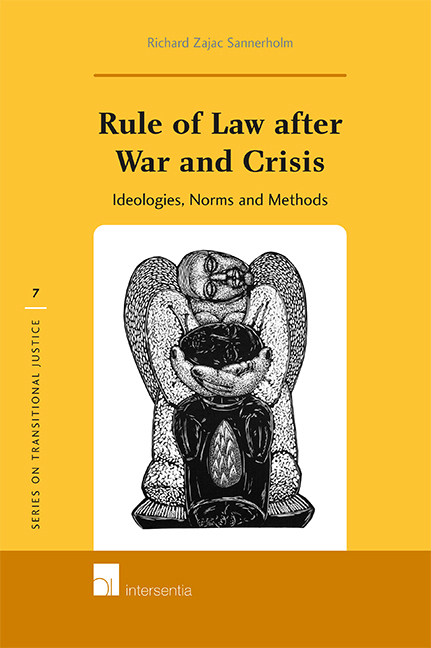1 - Rule of Law Reform – Theoretical Framework
Published online by Cambridge University Press: 16 December 2020
Summary
INTRODUCTION
The purpose of this chapter is to examine the modes of influence and forms of interventions by means of which international players seek to promote rule of law reform in war to peace transitions.
In order to understand the modes of influence that these actors employ, and to place them in a broader context, it is necessary to look at the terminology of rule of law reform, involving transplants, transfers and similar concepts that denote externally supported legal reform. The discourse on legal transplants serves to identify theories relating to problems and prospects of the methods used in externally promoted rule of law reform.
This chapter also analyses the role of the rule of law in war-torn societies, and illustrate, through a description of a crisis anatomy, some of the main features that characterise legal and administrative systems in war to peace transitions. It is important to acknowledge the deficits, problems, constraints and power structures that war-torn societies display, and the history and possible path dependencies in the legal and administrative systems.
International organisations involved in rule of law reform in both development cooperation and in war to peace transitions are increasingly criticised for insufficient understanding of the institutional histories and legal and social challenges in ‘recipient’ societies’. Rule of law reform in these gravely damaged societies faces different problems than rule of law promotion in development cooperation and this must be taken into account for the purpose of understanding the parts played by international actors, the choice of the methods used, and the role of national operators and their initiatives.
(UN)RULE OF LAW IN WAR-TORN AND CRISIS SOCIETIES
The whole question of rule of law promotion in war-torn societies, and its construction by a combination of parts or in accordance with a design or plan, is the function of law itself. This plainly varies depending on a number of general factors. History, culture, tradition, and social norms tend to leave a mark on legal and administrative systems. War-damaged societies also typically display a layered complexity of law: ‘formal’ state law exist together with customary and or religious law.
- Type
- Chapter
- Information
- Rule of Law after War and CrisisIdeologies, Norms and Methods, pp. 11 - 38Publisher: IntersentiaPrint publication year: 2012



